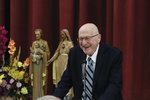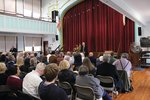

CRANSTON — The popular Catholic writer, professor, and philosopher Dr. Peter Kreeft delivered a lecture in the auditorium of St. Paul’s parish school in Cranston on Oct. 2, which focused on the spiritual battle between good and evil in society.
The lecture, titled “Spiritual Warfare: How People of Faith Can Combat Unholy Influences in Society,” reflected upon the spiritual and moral implications of the cultural revolution.
Kreeft, age 85, received his bachelor’s degree from Calvin College in Michigan, and his master’s and Ph.D. from Fordham University. Dr. Kreeft, who was born and raised as a member of the Dutch Reformed Church, underwent a conversion experience while in college, and formally entered the Catholic Church while undergoing post-graduate studies at Yale.
Kreeft is a long-standing member of the philosophy department at Boston College, having taught there since 1965. He has published many books and articles in the fields of philosophy, theology and apologetics.
His lecture began with a brief prayer and introduction from Father Thomas Woodhouse, the pastor of St. Paul’s parish. In his opening remarks, Father Woodhouse noted that Dr. Kreeft’s lecture was one in a series of events meant to commemorate the 100th anniversary of the founding of St. Paul’s school.
Kreeft began by pointing out that all of life has a spiritual implication to it.
“All life is spiritual warfare, ever since a certain incident with a snake and an apple in a garden,” he said to the packed auditorium.
“There’s always been spiritual warfare, but we didn’t talk about that that much in the past. We’re talking about it more, because it seems more obvious.” Kreeft said.
He went on to describe the current spiritual and moral state of our society, and how we as Catholics can contribute to the solutions of many of society’s moral ills.
Kreeft said that one of the signs of the moral decline of modern Western society is its sense of moral decadence, which is expressed most poignantly in a decline in church attendance and reception of the sacraments, and an increase in the number of people leaving the Catholic faith.
Another sign of the moral decadence of modern society, Kreeft pointed out, is an increase in divorce, noting that societies cannot thrive where divorce is high.
“Divorce is the suicide of the family, and families are the fundamental units of society,” Kreeft said.
Along with a decline in religious devotion and an increase in divorce, other signs of the decline of Western society include an increase in violence, the legalization of abortion, and increased support for radical gender ideology. In the academic realm, there is an increased adherence to relativism and a denial of immutable moral truth.
Dr. Kreeft noted that those on both ends of the political spectrum have noticed the decline of American society and desire to remedy the situation, but that facing the social ills of the day has led to increased radicalization and dogmatism with regard to political opinions, something that is coupled with the increased tendency to make religion out to be nothing but a tool for political gain.
“People today,” Kreeft asserted, “usually have religious action about their politics, and they politicize their religion. Politics and religion have changed places.”
All of this has led to a general decrease in the happiness levels of most Western societies.
Kreeft notes that, in response to this, some have attempted to redefine happiness in terms of success or material prosperity.
Dr. Kreeft went on to note that there are a few different ways to counteract these negative trends. One of them can be found in the tendency among some Catholics to devote much time to developing healthy families and forming close-knit communities with other Catholics. This has had the effect of improving the state of the family and increasing a sense of faith among some segments of the Church.
Another way of fighting against the moral decadence of the West is by fighting against the view on sex and relationships that emerged from the sexual revolution.
The best tool we as Catholics have in fighting against such views is the theology of the body formulated by Pope St. John Paul II, which attempted to defend the traditional Catholic view on sexual ethics by rooting it in the fundamental nature of the human person as created by God. Such a view, Kreeft went on to say, nuances and deepens the traditional Catholic views on these matters, thus noting that John Paul II’s theology of the body “doesn’t fit the stereotypes of the old or the new, the right or the left, the conservative or the liberal, it’s simply truth.”
Related to increasing faith, strengthening the family, and reorienting society’s views on sexuality is the need to grow in virtue. Kreeft pointed out a distinction between what he calls the “hard virtues” (courage, self-sacrifice, charity) and the “soft virtues” (compassion, tolerance, empathy), and noted that while society has done much to grow in the soft virtues, it has weakened in its ability to live out the hard virtues. Kreeft suggested that, for modern society to improve, it must continue to grow in the soft virtues while rediscovering the importance of the hard virtues.
Finally, Kreeft stated that ecumenism is another tool in the fighting of the culture war. An increase in a sense of personal respect and agreement among the world’s religions serves as a necessary counterbalance to the fracturing of values within society.
The most important piece of advice Kreeft ended with was to not run away from the spiritual challenges of the modern world and to remain firm in our convictions as Catholics, saying, “Our Lord mentioned one thing: awareness.
Think clearly. Don’t run away from it. Don’t paper it over. Don’t be everyone’s friend. If you’re not threatening [anyone else’s preconceived notions], either you don’t have a wide enough circle of friends or you are not Christian enough. If some of the splinters from the Cross aren’t drawing blood from you, you aren’t close enough.”
Kreeft’s lecture was generally well received. “It was wonderful. I enjoyed it very much,” said Odaltino Moniz, a parishioner of St. Thomas the Apostle parish in Warren.
“I thought it was really wonderful that our parish was able to draw a speaker with the resume, and the intellect, and the faithfulness of Dr. Kreeft. It was a pleasure to hear him talk on a Sunday afternoon about things that I worry about all the time,” said Rick Beyer, a parishioner of St. Paul’s.